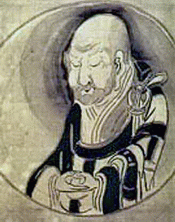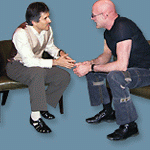Beezone adaptation and edit from various essays by Adi Da Samraj.
The First Truly Humanizing Stage of Development
People are constantly engaged in thinking, thinking…talking, talking, talking. Thinking and talking are really conversations, dialogues with ourselves and others. In thinking you’re talking to yourself and in talking your expressing your ‘thinking’ with someone else and in many cases it is quite a humorous affair. Did you ever observe people having a ‘conversation’ where it is clear that people are just talking AT each other rather than WITH each other.
The chronic, obsessive thinking (and talking) mind is a problem. It actually takes the form of of a problem. “What about this”? “What about that”? “Tell me about this”? “Tell me about that”? By using the mind one tries to get free of a problem or discover a solution to a problem, hoping that it will produce some understanding or some release.
When people talk with one another, they often talk about their hard times. They talk about difficulties relative to “money, food, and sex”. They meditate on their difficulties through the instrument of social communication. Such social magic is a way of meditating on the failure of life, on one’s self-indulgent and irresponsible life of conflict and seeking.
Thinking and bodily experiencing work together and are natural and ordinary conventions. They are useful, practical, inevitable functions, with every kind of personal and social significance. However, the doubt, anxiety, seeking, and answering (or escaping) that arise on the basis of confrontation with the inherent limitations of the body-mind are an exaggeration, a distortion, and a binding superimposition that we add to the simple processes of thinking and bodily experiencing. The inherent limitations of the mind or brain and the body create stress. Therefore, the search for answers must be understood and transcended before true relaxation, peace and the actual state of things are to be realized.
Speech is a form of sacrifice. It is a sacrifice of the life-force. It is not entertainment. People generally talk in order to empty themselves. That is another form of throwing the force out of this contraction so they don’t suffer it anymore. Whenever there is speech, whenever there is communication with the environment, whenever there is relationship, whenever there is use of the life-force, it is sacrifice.

Huang-lung Hui-nan (Jap., Oryo Enan, 1002-69). Chan/Zen master of the Rinzai school
It quite humorous when people try to use the mind and it’s thinking capability to discover an answer to the larger questions of life. It’s humorous because of it’s utter futility. If we are going to begin to help ourselves (and therefore others) we must clearly observe this mechanism and understand it. The search for answers to larger issues of this life must first begin with understanding the mind, it’s limitations and it’s source or root.
According to Adi Da the approach to understanding the larger questions of life with the mind are generally understood as the “talking” school of spiritual practice. The talking school of spiritual practitioners are those who analyze the larger issues though mind and it’s thinking capability. The method of discovery tends to attract those who have a minimal capability for real spiritual practice, yogic discipline, and deep meditation.
Talking school disciples, commonly referred to a Pundits or Talking Heads, are habituated to chronic thinking (reading) and obsessive talking (writing). They find the noble search for answers in objective cognitive and brain level analysis of existence. The “discipline” and the “Realization” in the “talking” school disciples are generally minimal, weak, superficial, arrogant, egoic and merely mental.
 Andrew Cohen and Ken Wiber
Andrew Cohen and Ken Wiber
The “Truths” and the understanding that we all seek, not only for ourselves but for the betterment of our planet and world are founded on noble causes. Searching for answers about further evolutionary development is necessary especially in our present time. But we must first understand ourselves before we can begin to understand something as large and complex as ‘the world’. A disturbed, troubled, fearful and strategically active state of mind (and body) cannot discover the larger conditions of our mind, body and world.

The first truly human or humanizing stage of development is to transcend the dissociative abstract mental and reactive emotional reaction to…
more >>>
The First Truly Human or Humanizing Stage of Development
(continued from Daily Reading)
The first truly human or humanizing stage of development is to transcend our dissociative emotional reaction to the inherent limitations of the body-mind and its experiences. It is only on the basis on this understanding that the actual Realization of Truth can be founded. It is not the problem-solving exercise of mind or psyche that Realizes the Truth, but only the relaxed openness or tacit suspension of mind, psyche, or attention itself permits that Realization. It is not the strategic exercise of the body, or the total body-mind, that Realizes the Truth of the body-mind, but only the relaxed openness or tacit suspension of all contraction, all knowledge (or “knowing about”), and all self-possession permits that Realization. The human individual must grow into an understanding of himself, such that the reactive programs of knowing and acting are transcended in a tacit Realization of the Transcendental Condition in which the body-mind is arising, floating, changing, and passing away.
Therefore, the Way of Life or Truth is a sober enterprise that is founded upon the mature equanimity of the body-mind. That Way is not itself characterized by mental knowledge, mystical states of the psyche, or physical and mental strategies for attainment. Those who take up that Way must have first matured to a sensitive state of psycho-physical equanimity, or freedom from reactive and self-possessed programs of thinking and bodily experiencing that cause one always to seek the Truth rather than presently surrender to the obvious Truth. Only when such maturity or equanimity has stabilized the body-mind can actual practice of the Way begin.
Many will read this and, having considered it, they will be moved to practice the Way itself. But such motivation is only the beginning. It is not the beginning of the Way, but it is the beginning of an approach to the Way. Actual practice of the Way must necessarily be preceded by a period of preparation, testing, and humanizing growth.
Some imagine that the practices associated with preparation for the Way are themselves practice of the Way. People all over the world are involved in serious religious, intellectual, meditative, and social practices that they presume are expressions of a life devoted to Truth. But actually such programs, while they may be positive, right, and necessary, are only expressions of the basic education of mankind. The Great Work only begins when the Truth is Realized and the body-mind is released into a Transfigured devotion to the Living Divine Reality.
I acknowledge and accept the necessity for people to hear and respond to the Teaching of Truth, and then to take up a progressive practice of study, personal discipline, service, community cooperation, and formal religious activity. But it must be understood that such is only preparation for ultimate practice, which is not a cultural program for the body-mind, but it is a practice in which the body-mind is constantly transcended jand transformed in direct Realization of the Divine or Transcendental Condition of self and world.
Therefore, listen and hear me, begin to grow again through study of the Way and gradual adaptation to truly human conditions of existence. Your practice will develop by stages, until mind and body are released of their self-possessed motives and reactive contractions, and a thoughtless sublimity will provide the “moment” or turning point for your ultimate life of practice. That “moment” is Enlightenment, or Perfect Ignorance, and it brings an end to the period of preparation, but it only begins the endless practice of the Way which inevitably follows.